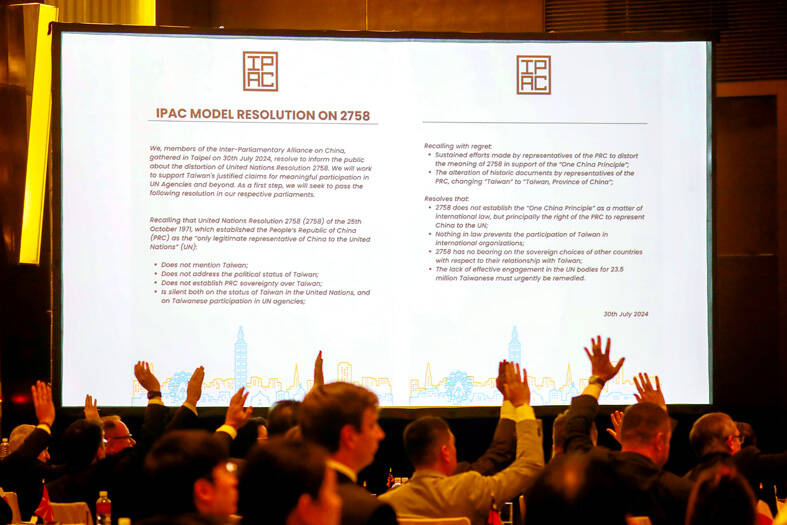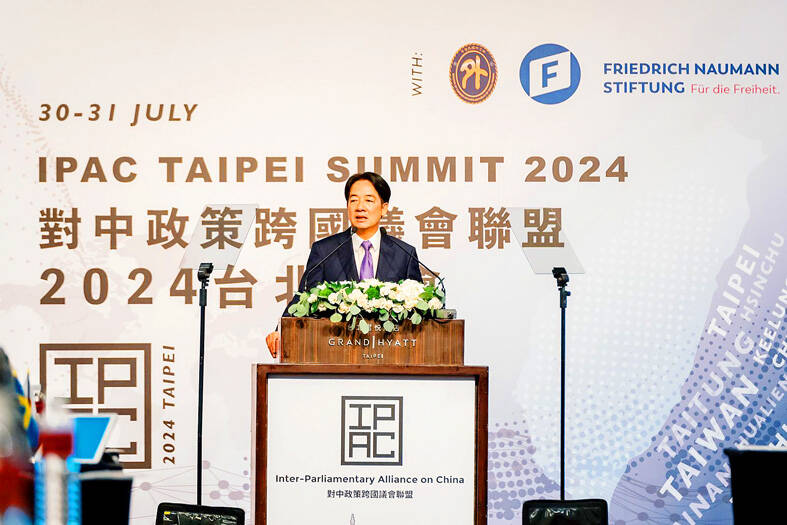China has falsely linked UN General Assembly Resolution 2758 with its “one China principle” and used the resolution to legitimize its acts to limit Taiwan’s participation in world bodies and possibly invade Taiwan by force, President William Lai (賴清德) said at the annual meeting of the Inter-Parliamentary Alliance on China (IPAC) in Taipei yesterday.
UN Resolution 2758 was passed by the UN General Assembly on Oct. 25, 1971, stating that the People’s Republic of China (PRC) is the legitimate government of China, which led to the PRC replacing the Republic of China (ROC), Taiwan’s official name, in the UN.
Beijing’s “one China principle” asserts that there is only one China, which is the PRC and not the ROC, and that it has jurisdiction over Taiwan.

Photo: EPA-EFE
Lai also thanked the US government and the European Parliament for repudiating China’s attempts to link the resolution and its “one China principle.”
Meanwhile, Taiwan was formally welcomed yesterday as an official IPAC member at the group’s annual meeting.
“Taiwan will do its best to put out a democratic protection umbrella with our democratic partners to keep them away from the threat of authoritarianism,” Lai said.

Photo courtesy of the Inter-Parliamentary Alliance on China
The president said Taiwan hopes to realize this goal by adhering to the “four pillars.”
Lai in an op-ed in the Wall Street Journal in July last year defined the pillars as building up the nation’s defense capabilities, promoting economic security and fostering supply chain resilience, forming partnerships with other democracies, and maintaining steady and principled cross-strait leadership.
Taiwan is resolute in its determination to maintain regional peace and stability, and deeply believes that peace and stability in the Taiwan Strait are linked with the development of global democracy, he said.
Lai cited recent Chinese aggression in the East and South China seas, and its joint military exercises with Russia as evidence of threats posed by autocratic expansion, while also citing this year’s NATO summit declaration that “China has become a decisive enabler of Russia’s war against Ukraine.”
During the meeting, all IPAC members agreed that China has distorted UN Resolution 2758 in their home nations and also agreed to enact efforts to support Taiwan’s participation in UN bodies.
The IPAC session stated that the 1971 resolution only confirmed that the PRC was China’s legal representative to the UN. It did not mention Taiwan or its political status, support China’s claims toward Taiwan or explicitly comment on Taiwan’s capability to join the UN and related bodies.
It is regrettable that China has distorted the meaning of Resolution 2758 to imply that it supports China’s “one China principle,” and equally regrettable to see China altering historical documents, changing references to “Taiwan” to “Taiwan, China.”
Separately, at a Ministry of Foreign Affairs banquet on Monday, IPAC chair Olivier Cadic said China’s recent guidelines targeting Taiwan might be in violation of UN human rights principles.
Cadic also called on China to stop its irresponsible and aggressive military actions, and to respect the rights of free passage to all ships sailing through the Taiwan Strait and the South China Sea.
Deputy Minister of Foreign Affairs Tien Chung-kwang (田中光) thanked IPAC for raising international awareness about Chinese efforts to undermine the international order, as well as those of members of the G7 and the G20.

CHAOS: Iranians took to the streets playing celebratory music after reports of Khamenei’s death on Saturday, while mourners also gathered in Tehran yesterday Iranian Supreme Leader Ayatollah Ali Khamenei was killed in a major attack on Iran launched by Israel and the US, throwing the future of the Islamic republic into doubt and raising the risk of regional instability. Iranian state television and the state-run IRNA news agency announced the 86-year-old’s death early yesterday. US President Donald Trump said it gave Iranians their “greatest chance” to “take back” their country. The announcements came after a joint US and Israeli aerial bombardment that targeted Iranian military and governmental sites. Trump said the “heavy and pinpoint bombing” would continue through the week or as long

TRUST: The KMT said it respected the US’ timing and considerations, and hoped it would continue to honor its commitments to helping Taiwan bolster its defenses and deterrence US President Donald Trump is delaying a multibillion-dollar arms sale to Taiwan to ensure his visit to Beijing is successful, a New York Times report said. The weapons sales package has stalled in the US Department of State, the report said, citing US officials it did not identify. The White House has told agencies not to push forward ahead of Trump’s meeting with Chinese President Xi Jinping (習近平), it said. The two last month held a phone call to discuss trade and geopolitical flashpoints ahead of the summit. Xi raised the Taiwan issue and urged the US to handle arms sales to

BIG SPENDERS: Foreign investors bought the most Taiwan equities since 2005, signaling confidence that an AI boom would continue to benefit chipmakers Taiwan Semiconductor Manufacturing Co’s (TSMC, 台積電) market capitalization swelled to US$2 trillion for the first time following a 4.25 percent rally in its American depositary receipts (ADR) overnight, putting the world’s biggest contract chipmaker sixth on the list of the world’s biggest companies by market capitalization, just behind Amazon.com Inc. The site CompaniesMarketcap.com ranked TSMC ahead of Saudi Aramco and Meta Platforms Inc. The Taiwanese company’s ADRs on Tuesday surged to US$385.75 on the New York Stock Exchange, as strong demand for artificial intelligence (AI) applications led to chip supply constraints and boost revenue growth to record-breaking levels. Each TSMC ADR represents

Pro-democracy media tycoon Jimmy Lai’s (黎智英) fraud conviction and prison sentence were yesterday overturned by a Hong Kong court, in a surprise legal decision that comes soon after Lai was jailed for 20 years on a separate national security charge. Judges Jeremy Poon (潘兆初), Anthea Pang (彭寶琴) and Derek Pang (彭偉昌) said in the judgement that they allowed the appeal from Lai, and another defendant in the case, to proceed, as a lower court judge had “erred.” “The Court of Appeal gave them leave to appeal against their conviction, allowed their appeals, quashed the convictions and set aside the sentences,” the judges